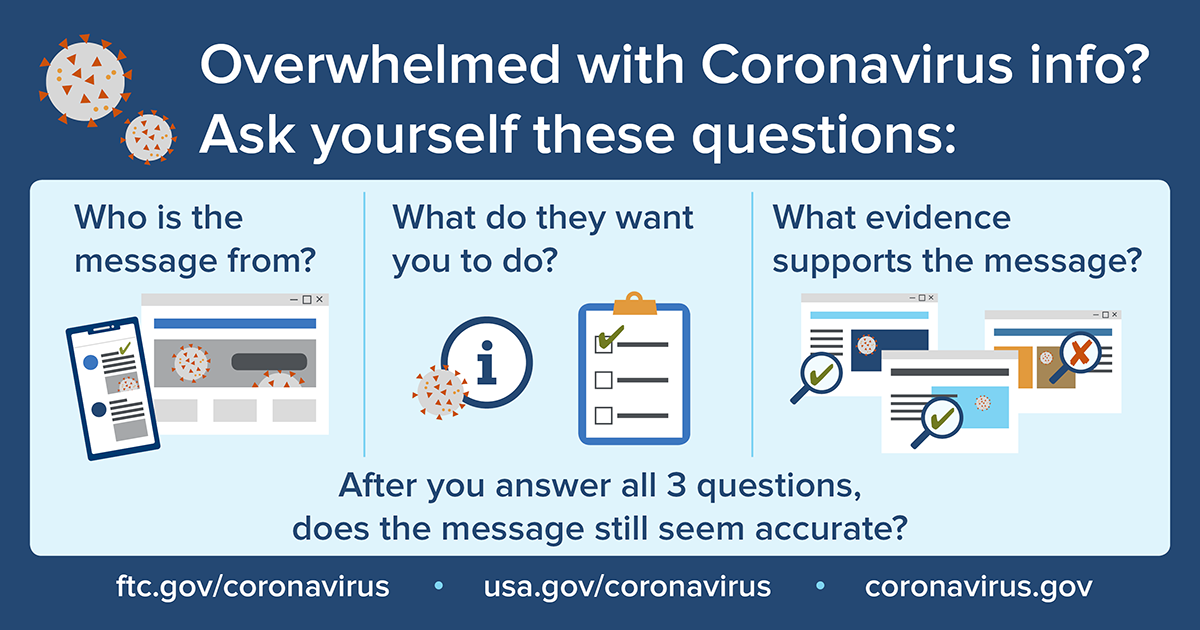COVID-19 Resources
A Helping Hand with COVID-19
Two of the most reliable sources for factual information regarding the Coronavirus (COVID-19) is the Centers for Disease Control and Prevention (CDC), and the World Health Organization (WHO). There is a lot of information available on the internet and in social media right now. We are not here to tell you what you should or shouldn’t believe, but rather to recommend that you check verified sources of information whenever you are in doubt about something you read or hear.

Centers for Disease Control and Prevention (CDC)
CDC is responding to a pandemic of respiratory disease spreading from person-to-person caused by a novel (new) coronavirus. The disease has been named “coronavirus disease 2019” (abbreviated “COVID-19”). This situation poses a serious public health risk. The federal government is working closely with state, local, tribal, and territorial partners, as well as public health partners, to respond to this situation. COVID-19 can cause mild to severe illness; most severe illness occurs in older adults.
World Health Organization (WHO)
WHO began when our Constitution came into force on 7 April 1948 – a date we now celebrate every year as World Health Day. We are now more than 7000 people working in 150 country offices, in six regional offices and at our headquarters in Geneva, Switzerland. Our primary role is to direct and coordinate international health within the United Nations system. Our main areas of work are health systems; health through the life-course; noncommunicable and communicable diseases; preparedness, surveillance and response; and corporate services. We support countries as they coordinate the efforts of governments and partners – including bi- and multilaterals, funds and foundations, civil society organizations and the private sector. Working together, we attain health objectives by supporting national health policies and strategies.
Some additional resources include:
The Department of Health Services (DHS) – Wisconsin
Another great resource for is The Department of Health Services (DHS) is one of the largest and most diverse state agencies in Wisconsin. DHS is committed to protecting and promoting the health and safety of the people of Wisconsin, making sure everyone can live their best life. DHS works with local counties, health care providers, community partners, and others to provide alcohol and other drug abuse prevention, mental health, public health, implementation of long-term care, disability determination, regulation of state nursing homes, and numerous other programs that aid and protect the citizens of our state. For information specific to Covid-19, go to https://www.dhs.wisconsin.gov/covid-19/index.htm
211.org
When you need help and don’t know where to turn, 211 is your one-stop connection to the local services you need, like utility assistance, housing, food, elder care, crisis intervention, alcohol and other drug recovery and much more. For information specifically related to Covid-19, please go to https://211wisconsin.communityos.org/coronavirus
Overwhelmed with COVID-19 info?
Bottom line: when you come across new — sometimes alarming — information, stop. Talk to someone else. Focus on whether the facts back up the information you’re hearing. Good, solid evidence will point you in the right direction. Then decide what you think and what you want to do with the message – pass it on, act on it, ignore it, or roll your eyes at it. And if you suspect a scam, tell the Federal Trade Commission so we can keep trying to shut the creeps down.

Additional resources, questions, and answers
JUST RELEASED! (04/20/2020) - Save Small Business Fund
For more information, visit https://savesmallbusiness.com/
SALVAR LA PEQUEÑA EMPRESA
Una ayuda a los empleadores experimentando dificultades durante la pandemia del COVID-19.
https://savesmallbusiness.com/spanish
Own a small businesses? Need financial and other assistance during COVID-19?
IMPORTANT
For the most up-to-date information, please go to https://fyi.extension.wisc.edu/covid19/2020/04/09/financial-assistance-for-small-businesses-during-covid-19/.Financial assistance for small businesses during COVID-19
The COVID-19 pandemic is leaving many Wisconsin businesses struggling and scrambling to find a way to manage through this public health crisis. Federal and State leaders moved quickly to provide resources to small businesses. Our goal is to provide clear, concise information and to provide access to valuable resources for Wisconsin’s small businesses and supporting partners.
Economic Injury Disaster Loan (EIDL)
The US Small Business Administration’s Economic Injury Disaster Loan (EIDL) is intended to provide low-interest federal disaster loans to small businesses. Small businesses suffering economic injury during the COVID-19 pandemic are able to apply for working capital loans up to $2 million to help overcome the temporary loss of revenue due to this crisis.
For more information, see The Small Business Owner’s Guide to the CARES Act and Wisconsin Small Business Development Center
Paycheck Protection Program (PPP)
Under the Coronavirus Aid, Relief and Economic Security (CARES) Act, the Paycheck Protection Program (PPP) offers small businesses access to forgivable loans to help survive during the COVID-19 pandemic. The PPP loans are intended to infuse capital into businesses to help retain employees. Small businesses, 501(c)(3) nonprofits, 501(c)(19) veteran organizations, and Tribal businesses with fewer than 500 employees are eligible to apply. Size standards vary based on industry and include either number of employees or total sales (see US SBA size standards). Individual sole proprietorships and independent contractors are also eligible for loans. Loans will be forgiven if employers maintain their payroll.
For a video demonstration of how to apply: SBA Paycheck Protection Program (PPP) Application Walkthrough
For more information, see The Small Business Owner’s Guide to the CARES Act and Wisconsin Small Business Development Center
Small Business 20/20 Program
The Small Business 20/20 Program through the Wisconsin Economic Development Corporation (WEDC) provides grants to community development financial institutions (CDFIs) to award grants up to $20,000 to existing loan clients. The Small Business 20/20 program is meant to assist businesses with cash flow during the COVID-19 pandemic. This program is for existing Wisconsin business that currently have a loan through an approved CDFI.
For more information, see Wisconsin Economic Development Corporation
Want to learn more, or want to see how Extension can assist? Contact Community Economic Development program for general inquiries or reach out to your local county Educator for specific assistance.
Additional Resources
Wisconsin Small Business Development Center
Do you have financial stress in your life?
IMPORTANT
For the most up-to-date information, please go to https://fyi.extension.wisc.edu/toughtimes/covid-19-financial-resources/.Recursos financieros que le pueden ayudar durante la pandemia de COVID-19
https://fyi.extension.wisc.edu/toughtimes/recursos-financieros-covid-19/
The coronavirus, also known as COVID-19, is impacting households, communities, and businesses. In a recent survey, 9 out of 10 Americans say that the pandemic is causing them financial stress, with half reporting that they are worried about paying their bills. The frequently asked questions to some common financial challenges we all are facing as a result of the COVID-19 pandemic can be answered in the links above and below. The answer to each question provides links to government websites and the types of assistance that might be available. We will keep updating this information as new policies and resources are put into place.
Please visit https://fyi.extension.wisc.edu/toughtimes/covid-19-financial-resources/ for these questions, answers, online resources, and Extension points of contact that can help you get through this uncertain time.
Recursos financieros que le pueden ayudar durante la pandemia de COVID-19
https://fyi.extension.wisc.edu/toughtimes/recursos-financieros-covid-19/
Need resources for at home learning? Look here!
Below you will find content that parents, caregivers, PreK-12 teachers and students can start using now to adapt to home learning. Some resources can be received through traditional TV and some through the internet. They are free, curriculum-based and classroom-tested.
- PreK-12 Resources for Emergency School Closings
- Recursos de PreK-12 para Cierres de Emergencia (Spanish)
- At Home Learning – Additional Resources
For more information, visit PBS at the following link: https://pbswisconsin.org/at-home-learning/
Do you have concerns about the safety of our food supply?
For additional resources at Extension related to your health and wellness, visit https://fyi.extension.wisc.edu/covid19/category/topics/health-wellness/




